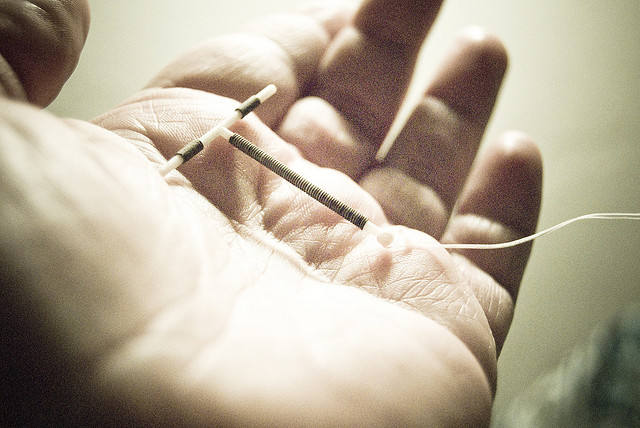The Upsides and Downsides of an IUD

Posted by Kadijah
January 12, 2015
Perhaps I am late to the party, but IUDs or intrauterine devices are becoming an increasingly used as a reversible contraceptive method. According to Planned Parenthood, IUDS are a “T-shaped” device inserted into the uterus to prevent pregnancy” that is placed in the woman’s uterus by a healthcare professional.
According to Michelle Andrews in Kaiser Health News, people who used methods of contraception between the years 2011 and 2013 used birth control pills at a rate of 26 percent, condoms at a rate of 15 percent, and IUDS at a rate of 12 percent.
.png)
Guttmacher Institute
The ParaGard (used for up to 12 years) and hormonal IUD ( the Mirena brand can be used for five years and the Skyla brand can be used for three years) are used in the United States. Over at Bedsider, they have a good analysis of the key differences in the three types of IUDs.
An example of the Paragard IUD:
Hormonal IUDs, much like hormonal birth control pills, they thicken the mucus in a woman’s cervix to prevent the joining of the sperm with the egg. ParaGard IUDs can act as preventive measure after unprotected penetrative sex with a male partner if it is inserted in less than five days of having sex.
*They do not prevent against sexually transmitted diseases.
Benefits of IUDs:
-
You do not have to remember taking birth control pills daily
-
They last for several years
-
Light periods and no periods in some cases
-
You can engage in sex immediately
Disadvantages of IUDs
-
Some women experience cramping after the IUD is put in place
-
Not having periods is a disadvantage for women who prefer to have periods
-
“The cost for the medical exam, the IUD, the insertion of the IUD, and follow-up visits to your health care provider can range from $0 to $1,000” (Planned Parenthood)
From what I have researched thus far, IUDs appear to be a very effective method of birth control that may provide some people with greater flexibility in their lives. It may, however, require increased doctor’s visits to ensure the effectiveness of the IUD. If you have wondered about IUDS and whether or not they might work for you, contact a health care professional who can provide insight in to IUDS as well as other contraceptive options. For college students especially, take advantage of the amenities at your institution by inquiring about the reproductive healthcare services available and the contraceptive methods offered at your school.
Leave a Reply
You must be logged in to post a comment.


